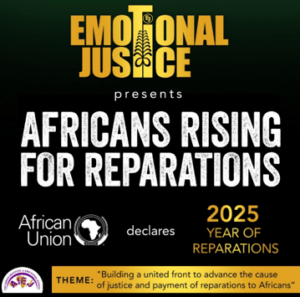By Esther A. ARMAH
IG:- @eaarmah @emotionaljustice
Tomatoes. Bedrock of Ghanaian cuisine. Used in recipes across the 16 regions of Ghana. Grown here too, by farmers. Eaten by nearly 30 million people on a weekly basis. We grow it. We consume it. So, why do not we have tomato millionaires?
We should have. We really should have. Jollof, chicken stew, kontomire, palm soup, light soup, goat soup, waakye – the list of all the ways we in Ghana consume tomatoes is long. So many of us eat it, cook with it, each day of every month of every year – year in and year out So, again, why don’t we have tomato millionaires?
One issue is we are a society that connects farming to poverty, lack of opportunity and undesirability. That is why we are a nation who need a healing economy. Our relationship to our own resources, what we grow, what comes from our soil, our home-grown economy needs healing. Nobody with a sense of identity that is valued, that is self-love, and self-respect privileges produce – but more specifically values produce – outside of what is grown on their own land, in their own nation.
It’s more than pure economics. It is about the emotional economy of our identity as a Ghanaian people. That emotional economy thinks that whatever is made outside of our nation’s shores is better, more powerful, more valuable than that which is home grown. We see this again and again across sectors and products.
It is time to repair and reclaim this economy and heal our relationship to it. We owe it, and we owe ourselves. A healing economy is reparations with a focus on our relationship to ourselves as African people. Heal that, and our relationship to farming changes completely.
Speaking of reparations…2025 has been named by the African Union as the Year of Reparations. The upcoming AU Summit in Addis Ababa will formally declare the year as such. What does this mean for us in Ghana? The AU focus is: Africa is substantially owed by nations who colonized and enslaved, its violence, and its lingering legacy. To connect the Continent in pursuit of reparations is powerful, critical and necessary.
We must ask other questions. What has been the impact of colonialism on how we see ourselves here in Ghana, and how we see each other?
My call is for us to turn inward. Look into the mirrors across our 16 regions to repair and reclaim what is powerful, what constitutes progress, and what offers us a secure future right here: a flourishing home-grown economy. I call it ‘a healing economy’.
Let’s start with the humble tomato. Why not start there? There is of course the tomato that is grown, there are raw tomatoes. There are tinned tomatoes, tomato paste – both could – and should – become part of a flourishing ecosystem.
I use the word ecosystem because my call for this healing economy is for us to do our own emotional work. That means we must connect land and legacy to leadership and lessons. The land is the wealth and we are living with the legacy of colonialism. For too long, we have had a political leadership – specifically in the political realm – with champagne rhetoric and runny egg commitment. In other words, the speeches are laudable, powerful and sexy; the action is runny, and thin.
The West – and specifically the US – to whom we in Ghana look to so often for leadership and loans is imploding, descending into authoritarianism. It is a nightmare for those living on those shores.
For us in Ghana it is a window – an opening to turn to our mirrors, stare clearly into our reflection and ask ourselves: what am I willing to do to transform Ghana into a nation that I can live in, build in, thrive in and flourish in? What is my portion?
Questions. Such questions come with answers steeped in action we each must be willing to take. And not simply take, but sustain. Why?
Because reparations are also about what we owe each other as global Black people, and what must be repaired and reclaimed right here in Ghana. It is about that as well as being about what is owed by colonizing and enslaving governments, whose very nations, economies, institutions and wealth was built by enslaved Africans and colonized Africans and Africa.
To this very day Ghana – and so many nations across the Continent – continue to be seen – and treated – as a landscape of extraction and exploitation.
We are daughters and sons of this soil. We are the fixers of its problems. We are the heroes and sheroes we have been waiting for. We are its genius and its wealth. We must be focused on the business of repair and reclamation.
A tomato millionaire is about wealth. It’s also about a commitment to repair and reclaim the land and those who work it as integral to the wealth of a nation. It is about determining a domestic policy where, if I am in Kempinski Hotel in Accra, or the local chop bar elsewhere in Ghana, a can of tinned tomatoes are grown, produced, manufactured, distributed and sold in Ghana, by Ghanaians to all who live, work, do business and make profit here.
We must connect reparations to the reclaiming of the ecosystems within our economy. They are our path to prosperity. This is not magic. It is steps. They require diligent, disciplined, step by step by step effort, engagement and commitment by millions of us.
Reclaiming our economy as home-grown means choosing our own produce no matter what alternative offers exist. Are Italian tomatoes better simply because they are Italian? Only self-hatred leads us to answer yes.
As The African Union – with all its challenges and short-comings – rallies to create a single focus on reparations in Africa, I invite us in Ghana to choose the mirror as a site of repair.
Let’s repair and reclaim the wealth of our land. That is a healing economy.
We begin with the tomato – and claim a future of tomato millionaires.

Esther A. Armah is CEO, The Armah Institute of Emotional Justice, a global non-profit headquartered in Accra, focused on racial healing. ‘Why don’t we have Tomato Millionaires?’ is part of a year-long Emotional Justice campaign called: ‘AFRICANS RISING FOR REPARATIONS’. Follow IG: @emotionaljustice Subscribe: www.theaiej.com










